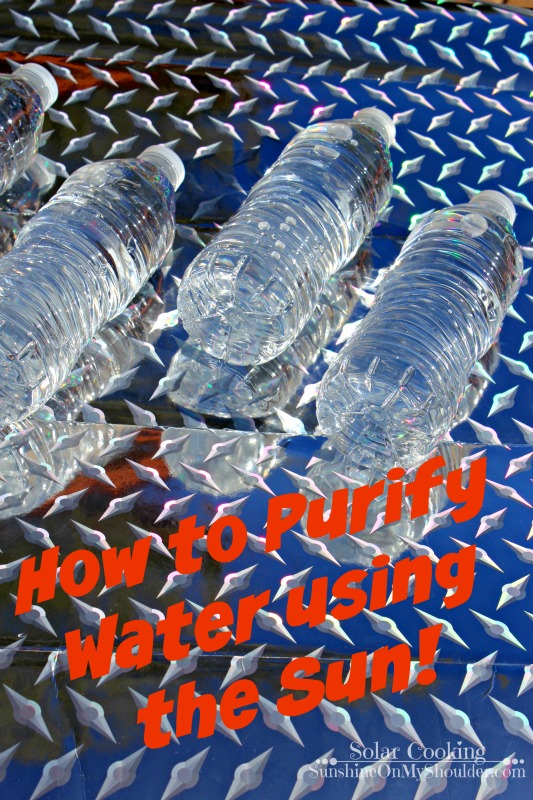................................................................................................................................................................
Water – fresh
clean pure water – is the most precious commodity on earth.
Water is the
very essence of life.
Without water,
we cannot live. Without water, we perish.
But in many
parts of the world, clean drinking water is becoming more and more difficult to
find.
And even in
developed countries, there are situations where we might find our drinking
water contaminated.
There are many
ways in which to purify water for drinking. Here is a little-known method that
might come in handy someday.
Water does not need to be boiled to be made safe for
drinking. Most microbes and pathogens will be killed at 150°F (65°C)
for just five minutes.
Solar radiation can purify water and make it safe to
drink.
Solar energy from the sun can disinfect water from
lakes and rivers. The UV rays from the sun can kill harmful bacteria,
parasites, and viruses, given enough exposure.
· Bacteria
E coli
Cholera
Salmonella
Shigella
Campylobacter jejuni
Yersinia e=Enterocolitica
· Parasites
Giardia
Crytosporidium
Entamoeba
worms
· Viruses
Rotovirus
The World Health Organization (WHO) recommends the
following low-tech method of disinfecting water.
Using only sunlight and PET plastic bottles, the SODIS
(solar disinfection) method uses a combination of UV sunlight and increased
temperature to kill pathogens in the water.
How To Purify Water Using The Sun
· The water
should be from a clean, well known water source, such as a lake or stream.
Running water is best.
Avoid standing water; smelly water; water with an oily
look; and water near latrines and sewers.
· The water must
not be chemically polluted. This method will kill bacteria, it will not remove
chemicals.
· If the water
has visible contaminants, such as dirt, mud, or debris, filter the water by
pouring it through several layers of cloth to catch as much sediment and debris
as possible.
Then any remaining sediment settle to the bottom and
filter until the water is as clear as possible. The UV rays will not be able to
penetrate through cloudy, dirty water.
· Use
clean, clear soda or water bottles no larger than 2 liters. The bottles
need to be in good condition with no scratches or other visible signs of
wear.
It is best to use a “PET” (PolyEthylene Terephthalate)
bottle. Look for the recycle code #1 on the bottom.
· Colored plastic
and glass bottles will block too much of the UV rays. Indeed, some glass will
block the UV rays completely
· Fill the
bottles 2/3 full of water and shake for 20 - 30 seconds. This will saturate the
water with oxygen, which will help to kill the germs.
Then finish filling the bottles to the brim with
water. Lay them down in the sun. Do not stand them up. Laying them down allows
the UV rays to penetrate to maximum depth.
· Although not
necessary if possible, lay the bottles on a reflective surface to optimize the
UV exposure.
· If the sky is
mostly sunny with only a few clouds, then 6 hours of sunlight will be enough.
However, if the sky is more than 50% cloudy, then it will take 2 days to
purify the water.
The ambient air temperature is not a factor, it is the
strength of the UV sunlight that is significant.
If there is a question about the proper length of time
because of the sky conditions, it is best to err on the side of caution and
allow the full 2 days of exposure.
· While there is
some concern that toxins may leach out of the plastic bottle during the
process, the Swiss Federal Laboratories For Materials Testing and
Research have examined this process and found that the levels of
toxins from the bottles is far below the WHO guidelines.
For more information on how to purify water using the
sun, please read Solar Water Disinfection or Water Pasteurization from SCInet or Water Pasteurization in a Pinch.
A simple device known as a WAPI (WAter Pasteurization Indicator) can also be
used to determine when the water has been heated long enough to be safe.
Welcome to Sunshine On
My Shoulder (SOMS), a guide to solar cooking and outdoor kitchen.
There is more to outdoor cooking than just grilled burgers and dogs. With
an outdoor kitchen consisting of 2 grills, 3 smokers, an assortment of
deep fryers and Dutch Ovens, and a yard full of solar cookers, we can cook just
about anything.
While Dutch Ovens have been
around for centuries, solar cooking is a relatively new way to cook. Solar
cooking is any method of cooking that uses the free energy that comes from the
sun as the primary fuel source. In the summer of 2008, when I began solar
cooking, there was very little information about solar cooking on the internet.
There were a couple of commercial sites that sold solar ovens, and a few sites
that focused on the science behind it. And although there were a few basic
recipes on those sites, there was not much information to help a beginner get
started. And there were no sites that focused on the food.


No comments:
Post a Comment